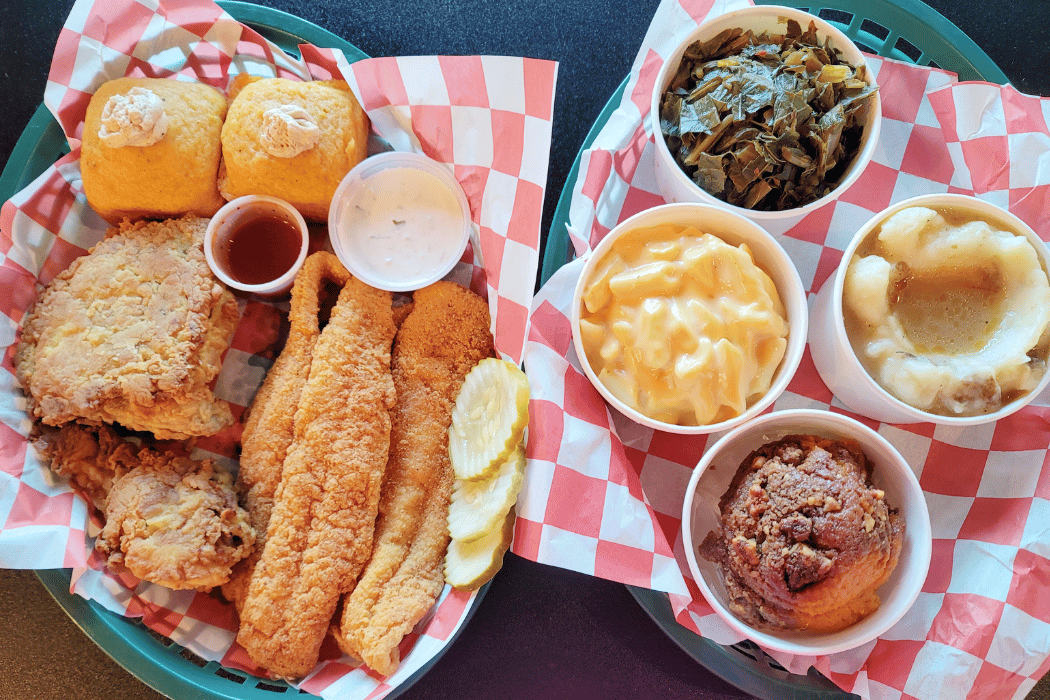
How Gladys Harrison Is Keeping Her Family’s Restaurant Alive in a Shifting Economy
In an exclusive interview with Gladys Harrison, owner of Big Mama’s Kitchen & Catering reveals how current tariffs and economic policies threaten the survival of family-owned establishments and the American Dream they represent.
This is the second in our series of articles examining the impact of the current administration’s economic policies on small businesses and diverse businesses.
In the heart of North Omaha, Nebraska, a neighborhood that has weathered decades of economic challenges, Gladys Harrison stands at the helm of Big Mama’s Kitchen & Catering—a soul food restaurant built on family recipes dating back generations. But today, Harrison faces a new threat that could jeopardize everything she’s worked for: soaring costs driven by current administration tariffs and economic policies.
“The first thing that I’ve noticed is the aluminum pans that we use to make cornbread,” Harrison explains. “The last time I bought them in July, they were like $152 a case, and I went to order some the other day and they were about $192.”
This isn’t just a story about cornbread pans. It’s about the ripple effects of economic policies that threaten to drown small businesses across America.
The Invisible Tax on Main Street America
For Harrison, the price jump represented a 26 percent increase in just a few months—a margin that small businesses with tight profit margins simply cannot absorb. Her immediate solution was to switch from disposable aluminum pans to reusable metal ones, but that decision comes with hidden costs.
“I’m going to get six fewer pieces of cornbread using the pans that can be washed. Plus, somebody has to wash it,” Harrison notes, highlighting the complex calculations small business owners must make daily. “Am I really saving money by doing that? Maybe on that one item I could be. But if this is going to multiply by five, six, seven, eight times, what products do we make in here in America? Most of what we buy comes from somewhere else.”
This observation cuts to the heart of the disconnect between national economic policy and the reality on Main Street. While tariffs are often framed as protecting American industries, the truth is more complicated for business owners like Harrison, who rely on imported goods where domestic alternatives simply don’t exist.
A Legacy at Risk
Big Mama’s Kitchen isn’t just a restaurant—it’s a living testament to four generations of African American culinary heritage. The business sells signature seasonings developed by Harrison’s great-grandmother and perfected by her mother, Patricia “Big Mama” Barron, who founded the restaurant at age 65.
“My mother wanted to be able to feed people all over the world,” Harrison explains. Their online spice business represents both a practical revenue stream and the fulfillment of a dream. But now, the tariffs threaten this legacy too.
“Our seasonings are all natural and they are made from things that don’t come from this country. And if they are outrageously priced, then I’m going to have to examine either how much I use or raising the price.”
Community Mission vs. Economic Reality
The importance of businesses like Big Mama’s Kitchen extends far beyond their balance sheets. Located in North Omaha, a historically Black community that has experienced redlining, disinvestment, and economic marginalization, the restaurant serves a diverse but economically disadvantaged population.
“We try to keep our prices as such that the people who live in our neighborhood can afford to eat there,” Harrison emphasizes. “The whole purpose of us being there is to provide services, a nice place to eat with great home-cooked soul food to the people in that community who want that type of food so that they have options other than fast food.”
This mission—providing quality, culturally significant food in a food desert—is threatened when input costs rise dramatically. Harrison faces an impossible choice: raise prices beyond what her community can afford or operate at unsustainable losses.
“How crazy is that, that there’s a restaurant in my neighborhood, but I can’t afford to eat at it,” she reflects.
The Post-Pandemic Vulnerability
Small businesses are particularly vulnerable to economic shocks in 2025, still recovering from the devastating impacts of the COVID-19 pandemic that began five years ago.
“The coronavirus was a huge blow to small businesses. There were a lot of businesses that didn’t make it past the coronavirus, particularly a lot of small businesses from all parts of the country,” Harrison notes. “What concerns me is if these tariffs happen, the worst-case scenario is there’s going to be another round of businesses that are going to be forced to close their doors because it just costs them too much to make their product and their customers won’t be able to afford it.”
This statement underscores a critical reality: small businesses operate with razor-thin margins and limited capital reserves. Many depleted their savings surviving COVID-19, leaving them with little capacity to absorb new financial pressures.
The American Dream in Jeopardy
For Harrison, like many small business owners, her establishment represents far more than a job—it’s an investment in her family’s future.
“This last 20 years of my life, I’ve put everything into the restaurant—my retirement money, my body, my mind in the hopes that I can leave something for my grandsons and my children to give them some choices and options that I didn’t have,” she says. “And these tariffs could really put generational wealth in jeopardy and not just small businesses.”
This perspective highlights another disconnect in policy discussions: tariffs aren’t just abstract economic tools but real-world barriers to building intergenerational wealth, particularly for Black entrepreneurs and other historically marginalized business owners who face additional systemic challenges in building and sustaining enterprises.
Empty Promises of Job Creation
Proponents of tariffs often argue they’re necessary to bring manufacturing jobs back to America, but Harrison questions the practical reality of this claim.
“I keep hearing these things, “These tariffs were imposed so that we can have more, bring more jobs back to America.’ Well, all the factories are gone. All these factories are now apartment buildings, shopping centers, or they’re gone,” she points out. “So, who has money to build a whole factory for somebody to work at? And how can a factory here in America compete with a factory in a country like Vietnam or China or Japan?”
This assessment cuts through political rhetoric to the practical challenges of revitalizing American manufacturing—a complex process that requires infrastructure investment, workforce development, and competitive market conditions that tariffs alone cannot create.
What Policymakers Are Missing
When asked what policymakers are failing to understand about small businesses, Harrison’s answer is blunt: “They’re missing the people. Period.”
She questions how lawmakers with access to economic forecasters, data analysts, and advanced technology could implement policies with such devastating effects on ordinary Americans.
“And how can you take all that information and still do the wrong thing? And things that are going to have the largest, greatest negative impact on more people than we probably have ever experienced in this country,” she wonders. “Who benefits from these tariffs? Whose best interest is being looked out for in imposing the tariffs? I certainly can’t figure it out.”
Her frustration extends to representatives who aren’t fulfilling their basic responsibility to advocate for constituents’ interests.
“Stand up for us and not go with the flow. Do the right thing. Do what we elected you for,” Harrison urges. “You cannot explain to me how these tariffs are going to enable me to pursue life, liberty, and the pursuit of happiness. How are these tariffs going to provide me with the ability or the tools to make the American dream happen for me?”
The Wider Economic Impact
The consequences of small business failures extend far beyond the owners themselves. Big Mama’s Kitchen employs local residents, many of whom face barriers to employment elsewhere.
“What we do at Big Mama’s, it may be just food, it may be just shipping you seasonings. But what we do is how the people that work for me provide for their families,” Harrison explains. “And if Big Mama’s fails and other restaurants, and other businesses that are small, because we can’t afford to buy the products we need to sell our products, nor can our customers pay the price that we have to charge for it, then where are all these people going to go work?”
This concern highlights the crucial role small businesses play in local economies, particularly in disadvantaged communities. They provide jobs, services, training opportunities, and economic circulation that large corporations often fail to offer in these areas.
Finding Resilience in Uncertainty
Despite these challenges, Harrison maintains a remarkable resilience rooted in faith and community values.
“My faith in God will be grounded my entire life. Do you hear me? ‘For I know the plans that I have made for you, the plans to prosper you and not to harm you, plans to give you a hope in the future.’ What keeps me going is my faith.”
She also believes in the fundamental goodness of people to come together during difficult times.
“At the heart of people, even at the heart of most people, is to do the right thing and to make the world a little bit better. I truly believe that,” Harrison affirms. “And people have always been how the world has moved forward through difficult times. It’s always the people. Us recognizing that we’re in community with each other and that we need each other.”
A Legacy Worth Fighting For

Harrison never planned to be a restaurant owner. As a young woman, she dreamed of climbing the corporate ladder, perhaps becoming “the president of IBM.” But family duty called when her mother opened Big Mama’s Kitchen at age 65.
“I thought, ‘This is something I’ll do for a while. And then when she doesn’t need me anymore, I’ll keep climbing the corporate ladder in the communications industry,'” Harrison recalls. “Well, all this really took off and it grew into something.”
When her mother was diagnosed with chronic lymphocytic leukemia in 2016, Harrison’s temporary help became a permanent commitment to continue the family legacy.
“My mother fulfilled her purpose in life with food. She used food to bring people together, to win people over, to show people love,” Harrison explains. “And I am to continue that legacy using food as a platform to show people the goodness of who God is and his kingdom, and that we all have a purpose.”
The restaurant has gained national recognition, appearing on the Food Network, Travel Channel, and Sundance Channel—a testament to both the quality of their food and the power of their story.
The Path Forward
As small business owners like Gladys Harrison navigate these economic headwinds, the need for responsive, practical economic policies has never been greater. The story of Big Mama’s Kitchen illustrates that tariffs and trade policies aren’t abstract economic levers but real-world forces that affect real people’s livelihoods, dreams, and communities.
For Harrison and countless small business owners across America, the hope is that policymakers will recognize the true cost of their decisions and prioritize policies that nurture rather than hinder the entrepreneurial spirit that built this nation.
In the meantime, Harrison continues serving up her great-grandmother’s recipes, washing those metal cornbread pans, and praying that this storm, like others before it, will eventually pass.













